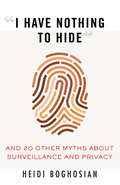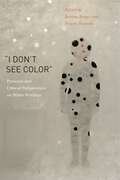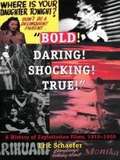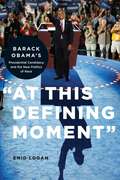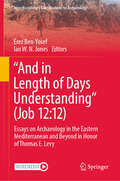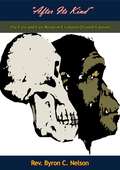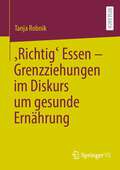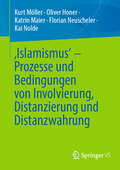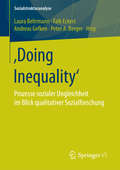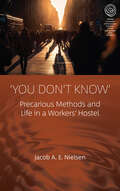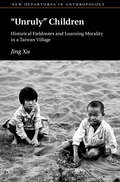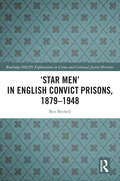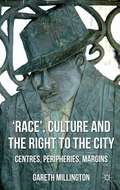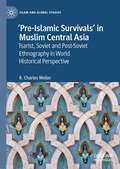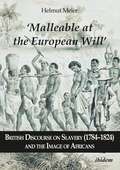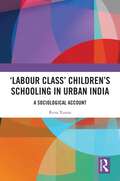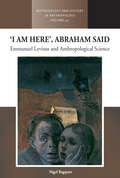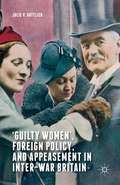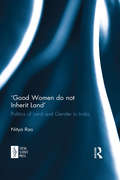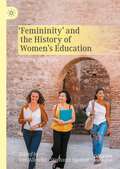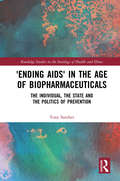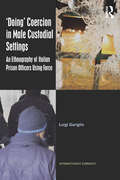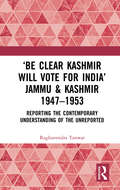- Table View
- List View
“I Have Nothing to Hide”: And 20 Other Myths About Surveillance and Privacy
by Heidi BoghosianAn accessible guide that breaks down the complex issues around mass surveillance and data privacy and explores the negative consequences it can have on individual citizens and their communities.No one is exempt from data mining: by owning a smartphone, or using social media or a credit card, we hand over private data to corporations and the government. We need to understand how surveillance and data collection operates in order to regain control over our digital freedoms—and our lives.Attorney and data privacy expert Heidi Boghosian unpacks widespread myths around the seemingly innocuous nature of surveillance, sets the record straight about what government agencies and corporations do with our personal data, and offers solutions to take back our information. &“I Have Nothing to Hide&” is both a necessary mass surveillance overview and a reference book. It addresses the misconceptions around tradeoffs between privacy and security, citizen spying, and the ability to design products with privacy protections. Boghosian breaks down misinformation surrounding 21 core myths about data privacy, including:● &“Surveillance makes the nation safer.&”● &“No one wants to spy on kids.&”● &“Police don&’t monitor social media.&”● &“Metadata doesn&’t reveal much about me.&”● &“Congress and the courts protect us from surveillance.&”● &“There&’s nothing I can do to stop surveillance.&”By dispelling myths related to surveillance, this book helps readers better understand what data is being collected, who is gathering it, how they&’re doing it, and why it matters.
“I Don’t See Color”: Personal and Critical Perspectives on White Privilege
by Bettina Bergo Eula Biss Tracey NichollsWho is white, and why should we care? There was a time when the immigrants of New York City’s Lower East Side—the Irish, the Poles, the Italians, the Russian Jews—were not white, but now “they” are. There was a time when the French-speaking working classes of Quebec were told to “speak white,” that is, to speak English. Whiteness is an allegorical category before it is demographic.This volume gathers together some of the most influential scholars of privilege and marginalization in philosophy, sociology, economics, psychology, literature, and history to examine the idea of whiteness. Drawing from their diverse racial backgrounds and national origins, these scholars weave their theoretical insights into essays critically informed by personal narrative. This approach, known as “braided narrative,” animates the work of award-winning author Eula Biss. Moved by Biss’s fresh and incisive analysis, the editors have assembled some of the most creative voices in this dialogue, coming together across the disciplines. Along with the editors, the contributors are Eduardo Bonilla-Silva, Nyla R. Branscombe, Drucilla Cornell, Lewis R. Gordon, Paget Henry, Ernest-Marie Mbonda, Peggy McIntosh, Mark McMorris, Marilyn Nissim-Sabat, Victor Ray, Lilia Moritz Schwarcz, Louise Seamster, Tracie L. Stewart, George Yancy, and Heidi A. Zetzer.
“Bold! Daring! Shocking! True!”: A History of Exploitation Films, 1919-1959
by Eric SchaeferUnashamed nudists, high-flying hopheads, brazen strippers, vicious vice lords, and high school girls who find themselves "in trouble" comprise the population of exploitation films. In the first full-scale history of these low-budget movies of decades past, Eric Schaefer reveals how this pioneering form of "trash film" purveyed the forbidden thrills of explicit sexual behavior, drug use, and vice that the mainstream movie industry could not show. Bold! Daring! Shocking! True! is a meticulously researched, interdisciplinary study that is informed by a wide range of sources--including both mainstream and industry newspapers and periodicals, archival accounts, personal interviews, and the films themselves. Schaefer begins by exploring the unique mode of production of exploitation movies, their distribution, and the outrageous exhibition practices that were rooted in the traditions of sideshows and carnivals. His close analysis of dozens of films, such as The Road to Ruin, Modern Motherhood, One Way Ticket to Hell, and The Wages of Sin demonstrates that these films were more than simply "bad" movies. By situating exploitation films in a historical context and organizing them according to the social problems they addressed, Schaefer shows how they evolved during a period of forty years and how, during that time, they shaped public policies and attitudes. Finally, he focuses on the changes in the postwar American film industry that led to the decline of the classical exploitation film and set the stage for the rise of "sexploitation" in the 1960s. Engagingly written, illustrated with rare photographs, posters, production stills, and ad slicks, and offering a full filmography, Bold! Daring! Shocking! True! reveals a forgotten side of film history and American culture. It will delight and inform those interested in film history, cultural studies, American studies and history, and the many fans of exploitation films.
“At This Defining Moment”: Barack Obama’s Presidential Candidacy and the New Politics of Race
by Enid Lynette LoganIn January 2009, Barack Obama became the 44th president of the United States. In the weeks and months following the election, as in those that preceded it, countless social observers from across the ideological spectrum commented upon the cultural, social and political significance of “the Obama phenomenon.” In “At this Defining Moment,” Enid Logan provides a nuanced analysis framed by innovative theoretical insights to explore how Barack Obama’s presidential candidacy both reflected and shaped the dynamics of race in the contemporary United States. Using the 2008 election as a case study of U.S. race relations, and based on a wealth of empirical data that includes an analysis of over 1,500 newspaper articles, blog postings, and other forms of public speech collected over a 3 year period, Logan claims that while race played a central role in the 2008 election, it was in several respects different from the past. Logan ultimately concludes that while the selection of an individual African American man as president does not mean that racism is dead in the contemporary United States, we must also think creatively and expansively about what the election does mean for the nation and for the evolving contours of race in the 21st century.
“And in Length of Days Understanding”: Essays on Archaeology in the Eastern Mediterranean and Beyond in Honor of Thomas E. Levy (Interdisciplinary Contributions to Archaeology)
by Ian W. N. Jones Erez Ben-YosefThis two-volume book presents cutting-edge archaeological research, primarily as practiced in the Eastern Mediterranean region. These volumes’ key foci are inspired by the work of Thomas E. Levy. Volume 1 provides an in-depth look at new archaeological research in the southern Levant (primarily in modern Israel and Jordan) inspired by Levy’s commitment to understanding social, political, and economic processes in a long-term or “deep time” perspective. Volume 2 focuses on new research in several key areas of 21st century anthropological archaeology and archaeological science. Volume 1 is organized around two major themes: 1) the later prehistory of the southern Levant, or the Neolithic, Chalcolithic, and Bronze Age, and 2) new research in biblical archaeology, or the historical archaeology of the Iron Age. Each section contains a combination of new perspectives on key debates and studies introducing new research questions and directions. Volume 2 is organized around five major themes: 1) the archaeology of the Faynan copper ore district of southern Jordan, a key region for archaeometallurgical research in West Asia where Levy conducted field research for over a decade, 2) new research in archaeometallurgy beyond the Faynan region, 3) marine and maritime archaeology, focusing on issues of trade and environmental change, 4) cyber-archaeology, an important 21st century field Levy conceived as “the marriage of archaeology, engineering, computer science, and the natural sciences,” and 5) key issues in anthropological archaeological theory. In addition to presenting the reader with an up-to-date view of research in each of these areas, the volume also has chapters exploring the connections between these themes, e.g. the maritime trade of metals and cyber-/digital archaeological approaches to metallurgy. The work contains contributions from both up-and-coming early career researchers and key established figures in their fields. This book is an essential reference for archaeologists and scholars in related disciplines working in the southern Levant and the Eastern Mediterranean.
“After Its Kind”: The First and Last Word on Evolution [Fourth Edition]
by Rev Byron C. NelsonThe pages of this book are the product of years of study of a Bible-lover who has gone through the fiery furnace of skepticism and has come out firmly convinced of the scientific trustworthiness of the first chapter of the Book of Genesis. In this book are contained the conclusions of an examining and weighing of evidences and arguments for and against the theory of evolution which began when, as a young man in the University of Wisconsin, the author’s Christian faith was almost destroyed by the wave of evolutionary philosophy and pseudo-science that has swept over the universities and colleges of our land.The incentive to write these pages was a desire to give to others the benefit of the author’s personal experience. Having been fortunate or unfortunate enough to have been caught early in life in the maelstrom of religious uncertainty that catches so many in our day, due to the widespread discussion of evolution, and having been driven by a desire to know the truth, cost what it may, to follow every important evolutionary argument to its end, and then having finally concluded that nothing is so scientific as the Bible statement “after its kind,” the author believed that a work on the subject of evolution by him might meet the needs of some others who were undergoing an experience like his.
‚Öffentliches Leben‘: Gesellschaftsdiagnose Covid-19 (Medienkulturen im digitalen Zeitalter)
by Andreas Langenohl Kornelia HahnMit Ausbruch der Covid-19-Pandemie beobachten wir plötzlich gravierende Veränderungen des sozialen Lebens, die die aktuelle Situation als tragisches Krisenexperiment fungieren lassen – ein Experiment, das sich besonders auch im Hinblick auf die Konzeptualisierung von Öffentlichkeit und die soziologische Beobachtung empirischer Öffentlichkeiten zeigt. Nicht zuletzt aufgrund des Drucks öffentlicher Kommunikation hat die Covid-19-Pandemie global zu fast vergleichbaren gesellschaftspolitischen Reaktionen geführt: Das öffentliche Leben ist innerhalb kürzester Zeit und flächendeckend wie nie zuvor eingeschränkt worden. Diese Einschränkung wird als fraglose Gegenmaßnahme kommuniziert, die sich aus der Art der pandemischen Bedrohung rational ableitet. Aus einer öffentlichkeitssoziologischen Sicht manifestiert sich in dieser Reaktion eine Gesellschaftsdiagnose mit Universalismusanspruch, die indes ambivalent bleibt: In Zeiten von Epidemien gilt öffentliches Leben als ebenso gefährlich wie gefährdet.
‚Richtig‘ Essen – Grenzziehungen im Diskurs um gesunde Ernährung
by Tanja RobnikDie vorliegende Studie fokussiert auf die diskursive Herstellung ‚richtiger‘ Ernährung und deren Bedeutung für die Ordnung moderner Gesellschaften. Sie analysiert gegenwärtige massenmediale Thematisierungen von Ernährung anhand der Leitfrage, wie entlang von Ernährungsdebatten die Normierung und Moralisierung sozialer Ordnung empirisch geschieht. Die Frage nach der ‚richtigen‘ Ernährung wird als Diskurs verortet, der die empirischen Verhandlungen des ‚was‘ (das ‚richtige‘ Essen), ‚wie‘ (‚richtige‘ Körper) und ‚wer‘ (die ‚Essenden‘) des Essens bzw. der Ernährung sichtbar macht. Das Forschungsvorhaben zielt dabei darauf ab, die eine ‚richtige‘ Ernährung im Sinne einer Baukastenanleitung herauszuarbeiten. Es beobachtet vielmehr, dass Ernährung gesellschaftlich erklärungsbedürftig ist. Essverhalten und -entscheidungen brauchen Begründungen und sind nicht immer gleich akzeptiert. Der diskurstheoretische Blick auf diese Auseinandersetzungen zeigt, welche Wissensformationen sich durchsetzen, in welcher Form sich Ernährungswissen plausibilisiert und wie sich dadurch ein hegemonialer Diskurs über die ‚richtige‘ Ernährung und die Essenden zeigt.
‚Islamismus‘ - Prozesse und Bedingungen von Involvierung, Distanzierung und Distanzwahrung
by Oliver Honer Kurt Möller Kai Nolde Katrin Maier Florian NeuschelerWarum und wie wird jemand zu einem sogenannten Islamisten oder zu einer Islamistin? Wieso, auf welche Weise und wann erfolgen Distanzierungen von solchen Haltungen und Sozialzusammenhängen? Was sind relevante Bedingungen dafür, dass ‚islamistische‘ Ansprachen bei anderen Adressierten nicht verfangen und sie jegliche Involvierung ablehnen? Dies sind die zentralen Fragen, zu denen dieses Buch Antworten präsentiert und daraus abgeleitet Handlungsempfehlungen formuliert. Dafür fasst es den aktuellen Forschungsstand zusammen und informiert über die empirischen Befunde der an der Hochschule Esslingen von 2019 bis 2022 durchgeführten Studie Wendezeit. Es handelt sich um eine auf junge Menschen fokussierte, längsschnittlich angelegte und qualitativ-rekonstruktive Untersuchung. Sie basiert auf Interviews mit 44 ehemalig ‚islamistisch‘ involvierten Proband:innen bzw. mit solchen, die Kontakte zu ‚islamistischen‘ Kontexten hatten, aber Distanz wahrten. In ausgewählten Fällen wurden Gespräche mit Distanzierungsberater:innen und Umfeldangehörigen der Betroffenen in die Auswertung einbezogen.
‚Doing Inequality‘: Prozesse sozialer Ungleichheit im Blick qualitativer Sozialforschung (Sozialstrukturanalyse)
by Peter A. Berger Laura Behrmann Falk Eckert Andreas GefkenDie Beiträge des Bandes zeigen und diskutieren das Potenzial einer mikrosoziologischen, prozessorientierten – qualitativen – Ungleichheitsforschung. Sie spüren Praktiken sozialer Besser- und Schlechterstellung in den Bereichen Bildung, Arbeit, soziale Beziehungen und Migration auf. Mit der interpretativen, handlungstheoretischen oder praxissoziologischen Perspektive machen sie das „Doing Inequality“, die Gemachtheit und die Vollzugswirklichkeit sozialer Ungleichheit sowie die Rolle von Akteuren bei der Herstellung, der Reproduktion und dem Wandel von sozialen Ungleichheiten zentral. Soziale Ungleichheiten ergeben sich aus der regelmäßig ungleichen Verteilung „wertvoller Güter“ einer Gesellschaft. Doch wie werden diese zugeteilt, angeeignet oder vorenthalten?
‘You Don’t Know’: Precarious Methods and Life in a Workers' Hostel (EASA Series)
by Jacob A. E. NielsenPeople employed at sites of precarious work such as call centres or retail warehouses often live precarious lives. Drawing on ethnographic research in a London hostel for precarious workers, the book explores the political, analytical and practical limitations of using traditional methods of trying to make sense of life in these settings. Traditional methods are rooted in practices that emerge from privileged social positions and their enactment is deeply entangled with the processes that create these conditions in the first place. This book responds to this by experimenting with ‘precarious methods’ to enable greater agency to those placed in these precarious situations.
‘Unruly’ Children: Historical Fieldnotes and Learning Morality in a Taiwan Village (New Departures in Anthropology)
by Jing XuHow do we become moral persons? What about children's active learning in contrast to parenting? What can children teach us about knowledge-making more broadly? Answer these questions by delving into the groundbreaking ethnographic fieldwork conducted by anthropologists Arthur and Margery Wolf in a martial law era Taiwanese village (1958-60), marking the first-ever study of ethnic Han children. Jing Xu skillfully reinterprets the Wolfs' extensive fieldnotes, employing a unique blend of humanistic interpretation, natural language processing, and machine-learning techniques. Through a lens of social cognition, this book unravels the complexities of children's moral growth, exposing instances of disobedience, negotiation, and peer dynamics. Writing through and about fieldnotes, the author connects the two themes, learning morality and making ethnography, in light of social cognition, and invites all of us to take children seriously. This book is ideal for graduate and undergraduate students of anthropology and educational studies.
‘Star Men’ in English Convict Prisons, 1879-1948 (Routledge SOLON Explorations in Crime and Criminal Justice Histories)
by Ben BethellThis book tells the story of the star class, a segregated division for first offenders in English convict prisons; known informally as ‘star men’, convicts assigned to the division were identified by a red star sewn to their uniforms. ‘Star Men’ in English Convict Prisons, 1879–1948 investigates the origins of the star class in the years leading up to its establishment in 1879, and charts its subsequent development during the late-Victorian, Edwardian, and interwar decades. To what extent did the star class serve to shield ‘gentleman convicts’ from their social inferiors and allow them a measure of privilege? What was the precise nature of the ‘contamination’ by which they and other ‘accidental criminals’ were believed to be threatened? And why, for the first twenty years of its existence, were first offenders convicted of ‘unnatural crimes’ barred from the division? To explore these questions, the book considers the making and implementation of penal policy by senior civil servants and prison administrators, and the daily life and work of prisoners at policy’s receiving end. It re-examines evolving notions of criminality, the competing aims of reformation and deterrence, and the role and changing nature of prison labour. Along the way, readers will encounter an array of star men, including arsonists, abortionists, sex offenders and reprieved murderers, disgraced bankers, light-fingered postmen, bent solicitors, and perjuring policemen. Taking a fresh look at English prison history through converging lenses of class, sexuality, and labour, ‘Star Men’ in English Convict Prisons, 1879-1948 will be of great interest to penal historians and historical criminologists, and to scholars working on related aspects of modern British history.
‘Race’, Culture and the Right to the City
by Gareth MillingtonAdopting a perspective inspired by Henri Lefebvre, this book considers the spread of multiculture from the central city to the periphery and considers the role that 'race' continues to play in structuring the metropolis, taking London, New York and Paris as examples.
‘Pre-Islamic Survivals’ in Muslim Central Asia: Tsarist, Soviet and Post-Soviet Ethnography in World Historical Perspective (Islam and Global Studies)
by R. Charles WellerThe book traces the conceptual lens of historical-cultural ‘survivals’ from the late 19th-century theories of E.B. Tylor, James Frazer, and others, in debate with monotheistic ‘degenerationists’ and Protestant anti-Catholic polemicists, back to its origins in Jewish, Christian and Muslim traditions as well as later more secularized forms in the German Enlightenment and Romanticist movements. These historical sources, particularly the ‘dual faith’ tradition of Russian Orthodoxy, significantly shaped both Tsarist and later Soviet ethnography of Muslim Central Asia, helping guide and justify their respective religious missionary, social-legal, political and other imperial agendas. They continue impacting post-Soviet historiography in complex and debated ways. Drawing from European, Central Asian, Middle Eastern and world history, the fields of ethnography and anthropology, as well as Christian and Islamic studies, the volume contributes to scholarship on ‘syncretism’ and ‘conversion’, definitions of Islam, history as identity and heritage, and more. It is situated within a broader global historical frame, addressing debates over ‘pre-Islamic Survivals’ among Turkish and Iranian as well as Egyptian, North African Berber, Black African and South Asian Muslim Peoples while critiquing the legacy of the Geertzian ‘cultural turn’ within Western post-colonialist scholarship in relation to diverging trends of historiography in the post-World War Two era.
‘Malleable at the European Will’: British Discourse on Slavery (1784–1824) and the Image of Africans
by Helmut MeierHelmut Meier‘s study of pro- and anti-slavery texts from 1784–1825 focuses on understanding the distinct image of Africans in the British debate on the slave trade and slavery as such. Starting from the premise that, at the threshold from the early to the late modern period, the distinct image of Africans as slaves was instrumental in universalizing a Eurocentric concept of capitalist wage labor both at the colonial centres and margins, Meier argues that, by portraying African slaves as suffering wretches, especially anti-slavery texts created colonial Others in an indistinct zone between inclusion and exclusion from humanity. The discourse on slavery thus constructs African slaves as mimetic Others which could subsequently become the objects of a discourse of colonial reform and ‘betterment.’
‘Labour Class’ Children’s Schooling in Urban India: A Sociological Account
by Reva YunusDrawing upon classroom ethnography and interviews with parents and pupils in urban central India, this book offers systematic sociological analyses of childhood, labour and schooling in postcolonial, post-liberalisation India. It combines insights from economic sociology, political economy and feminist critiques of capitalism, caste patriarchy and globalisation to theorise the relationship between educational experience and socioeconomic inequalities. A vital intervention in dominant development discourses centring on the relationship between poverty and poor children’s schooling in the global South it unpacks poverty as a structural condition shaped by class and caste relations. Unravelling the interplay of poverty, caste patriarchy and shifts in the gendered division of reproductive labour it challenges both the ‘girl effect’ narrative as well as the ‘school/labour’ binary. It offers insights into ‘labour class’ families’ experience of urban informal work enabling a critical account of the gendered place of school in children’s lives and render visible poor parents’ and pupils’ efforts to ensure educational success. Thick descriptions of pedagogic and disciplinary processes and social relations in the classroom allow it to grapple with teachers’ ‘deficit view’ of the labour class as well as the impact of stratified schooling on teachers’ working conditions and teacher-pupil relations. The book presents a rare account of teenaged children’s gendered modes of negotiation of social relations at school and home, waged and unwaged work, economic and educational deprivation and pedagogic practices in the classroom. It will appeal to scholars interested in the sociology of education and childhood, gender and caste inequalities, international development, poverty and urban informal work.
‘I am Here’, Abraham Said: Emmanuel Levinas and Anthropological Science (Methodology & History in Anthropology #47)
by Nigel RapportEmmanuel Levinas’s philosophical work on ‘the Other’ offers a challenge to the discipline of anthropology that claims knowledge of the human. For Levinas, the ‘secrecy’ of subjectivity – a fundamental facet of the human condition – demands an ethics of ignorance and not-knowing; the mystery of otherness is only to be approached through ‘inspiration’. Can anthropology meet a Levinasian challenge if it would define itself as a science as well as a humanistic documentation of social life? This book endeavours to take Levinasian and anthropological precepts equally seriously and offers a radical conclusion.
‘Guilty Women’, Foreign Policy, and Appeasement in Inter-War Britain: Foreign Policy, And Appeasement In Inter-war Britain
by Julie V. GottliebBritish women were deeply invested in foreign policy between the wars. This study casts new light on the turn to international affairs in feminist politics, the gendered representation and experience of the Munich Crisis, and the profound impression made by female public opinion on PM Neville Chamberlain in his negotiations with the dictators.
‘Good Women do not Inherit Land': Politics of Land and Gender in India
by Nitya RaoLand for the adivasi Santal women in Dumka, Jharkhand stands for security, social position and identity, and in this men have a distinct advantage. The time period covered is from historic times to the present. The role of government administrative bodies, NGOs and political leaders is also emphasized. Please note: Taylor & Francis does not sell or distribute the Hardback in India, Pakistan, Nepal, Bhutan, Bangladesh and Sri Lanka
‘Femininity’ and the History of Women's Education: Shifting the Frame
by Tim Allender Stephanie SpencerThis book draws on recent deconstructions around the idea of ‘femininity’ as a social, racial and class construct and explores the diversity of spaces that may be defined as educational that range from institutional contexts to family, to professional outlooks, to racial identity, to defining community and religious groupings. It explores how notions of femininity change across time and place, and within individual lives. Such changes take place at the interface of external forces and individual agency. The application of the notion of ‘femininity’ that assumes a consistent definition of the term is interrogated by the authors, leading to a discussion of the rich possibilities for new directions in research into women’s lives across time, place, and individual life histories.
‘Ending AIDS’ in the Age of Biopharmaceuticals: The Individual, the State and the Politics of Prevention
by Tony SandsetThis book considers the change in rhetoric surrounding the treatment of AIDS from one of crisis to that of ‘ending AIDS’. Exploring what it means to ‘end AIDS’ and how responsibility is framed in this new discourse, the author considers the tensions generated between the individual and the state in terms of notions such as risk, responsibility and prevention. Based on analyses public health promotions in the UK and the US, HIV prevention science and engaging with the work of Foucault, this volume argues that the discourse of ‘ending AIDS’ implies a tension-filled space in which global principles and values may clash with localised needs, values and concerns; in which evidence-based policies strive for hegemony over local, tacit and communal regimes of knowledge; and in which desires compete with national and international ideas about what is best for the individual in the name of ‘ending AIDS’ writ large. As such, it will appeal to scholars of sociology and media studies with interests in the sociology of medicine and health, medical communication and health policy.
‘Dying' to be White: The Obsession with Fair Skin in India and the Global South
by Purnima Mehta BhattThis book examines the phenomenon of colorism in India and the Global South and critically analyses the obsession with fair skin and its association with social capital or mobility.Exploring the prevalence of colorism in India, China, Japan, Vietnam, South Africa, Brazil, Argentina, Kenya and Australia, it traces its roots in history, scriptures, travel narratives, contemporary media and popular culture. How much did colonialism and European imperialism contribute to the desire to be white? How have globalization and the spread of consumer culture and Western ideals of beauty helped exacerbate these issues? The author discusses these questions while looking at the aspirations for beauty and modernity among these societies and the growing popularity of the use of creams, lotions and other methods to whiten the skin as a means to assimilate, emulate the West and gain better prospects and life.Lucid and topical, this book will be an essential read for scholars and researchers of race and colorism, sociology, social history, social anthropology, cultural studies, consumer economics, Asian studies and South Asian studies.
‘Doing’ Coercion in Male Custodial Settings: An Ethnography of Italian Prison Officers Using Force (Interactionist Currents)
by Luigi GariglioThis book offers a sustained study of one feature of the prison officer’s job: the threat and use of force, which the author calls ‘doing’ coercion. Adopting an interactionist, micro-sociological perspective, the author presents new research based on almost two years of participant observation within an Italian custodial complex hosting both a prison and a forensic psychiatric hospital. Based on observation of emergency squad interventions during so-called ‘critical events’, together with visual methods and interviews with staff, ‘Doing’ Coercion in Male Custodial Settings constitutes an ethnographic exploration of both the organisation and the implicit and explicit practices of threatening and/or ‘doing’ coercion. With a focus on the lawful yet problematic and discretionary threatening and 'doing’ of coercion performed daily on the landing, the author contributes to the growing scholarly literature on power in prison settings, and the developing field of the micro-sociology of violence and of radical interactionism. As such, it will appeal to scholars of sociology, anthropology and criminology with interests in prisons, power and violence in institutions, and visual methods.
‘Be Clear Kashmir will Vote for India’ Jammu & Kashmir 1947-1953: Reporting the Contemporary Understanding of the Unreported
by Raghuvendra TanwarThe central point that this volume makes is that much of what happened in Jammu & Kashmir in the critical first few years (1947-53) needs a more careful reassessment. It is argued that there were little voices of ordinary people that should have been heard but were ignored. The political discourse that took centre stage even as it appeared more assertive and representative of mass public opinion was, however, as is now clear only a clever and misleading political move.Much of the source material upon which the author has based his study has till now remained unstudied and uncited – rare hard to find books, pamphlets, articles in journals, magazines and newspapers, official and party reports and so on. The volume takes the reader back in time to a kind of ring side seat. Kashmir’s cultural and historical legacy, the invasion, the issue of the plebiscite, the United Nations and the ceasefire, the Praja Parishad and most important of all the political scene and its key players – Prime Minister Nehru, Dr Syama Prasad Mookerjee and Sheikh Abdullah. Based on the nature of its sources the volume breaks free of a stereotyped approach to understanding the origin of what we commonly term today as the ‘Kashmir problem’.The volume argues that contemporary views recorded as they are in the heat of the moment with natural spontaneity often contain hidden lines and new light. Not surprisingly contemporary versions tell us a story very different from mainstream conventional writings on Jammu & Kashmir. This timely volume will radically influence the existing discourse on Jammu & Kashmir. Please note: Taylor & Francis does not sell or distribute the Hardback in India, Pakistan, Nepal, Bhutan, Bangladesh and Sri Lanka
